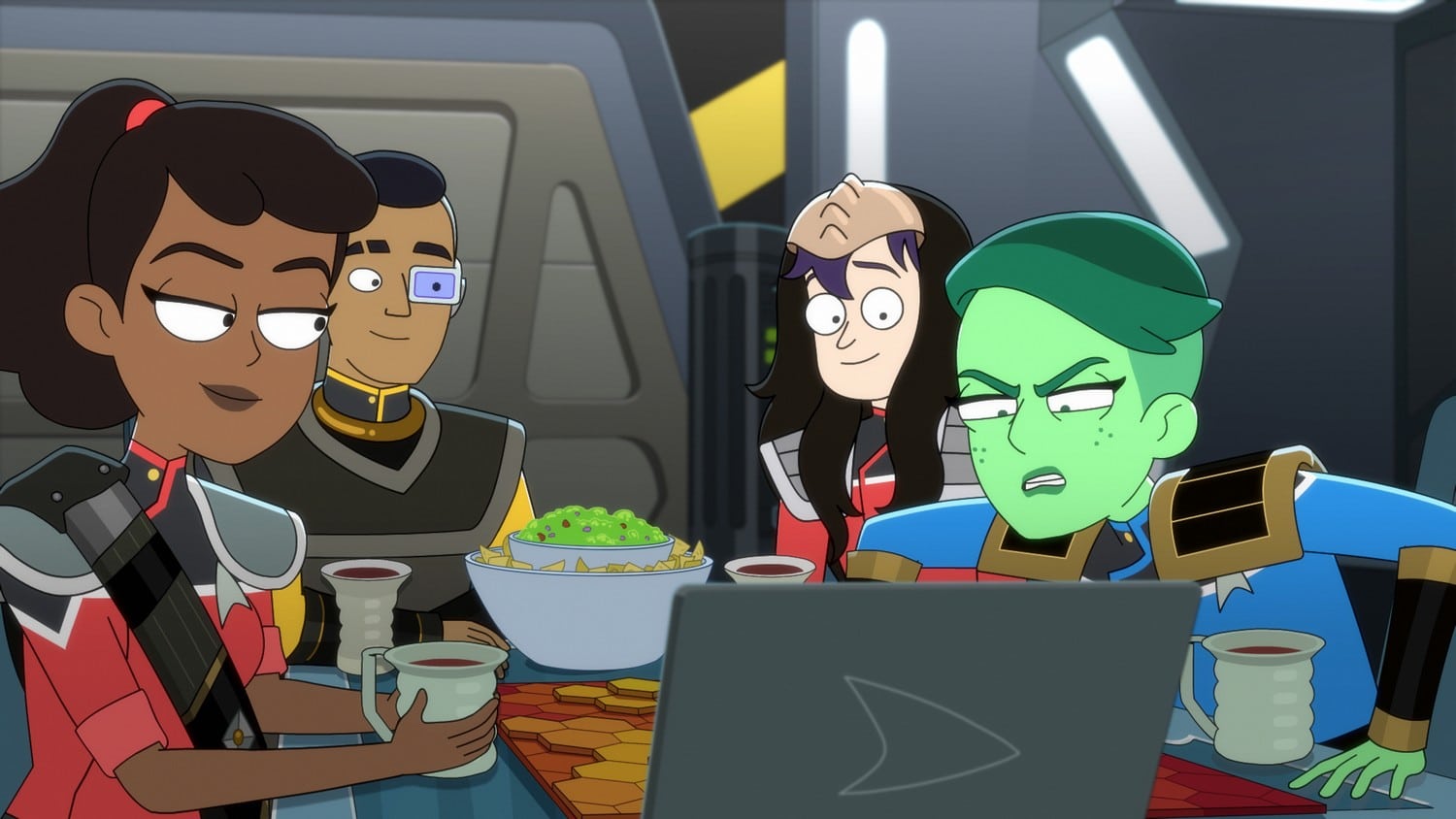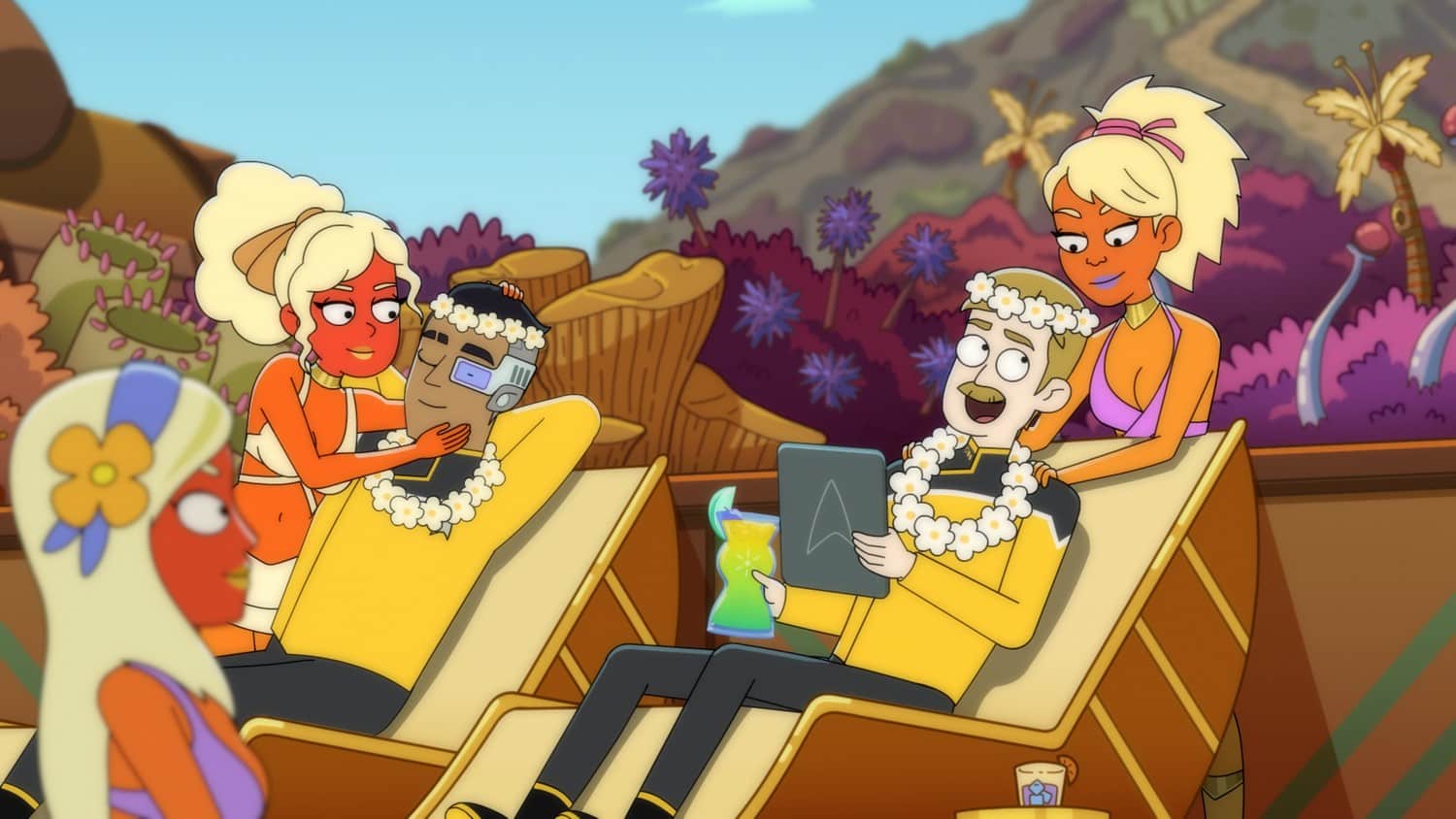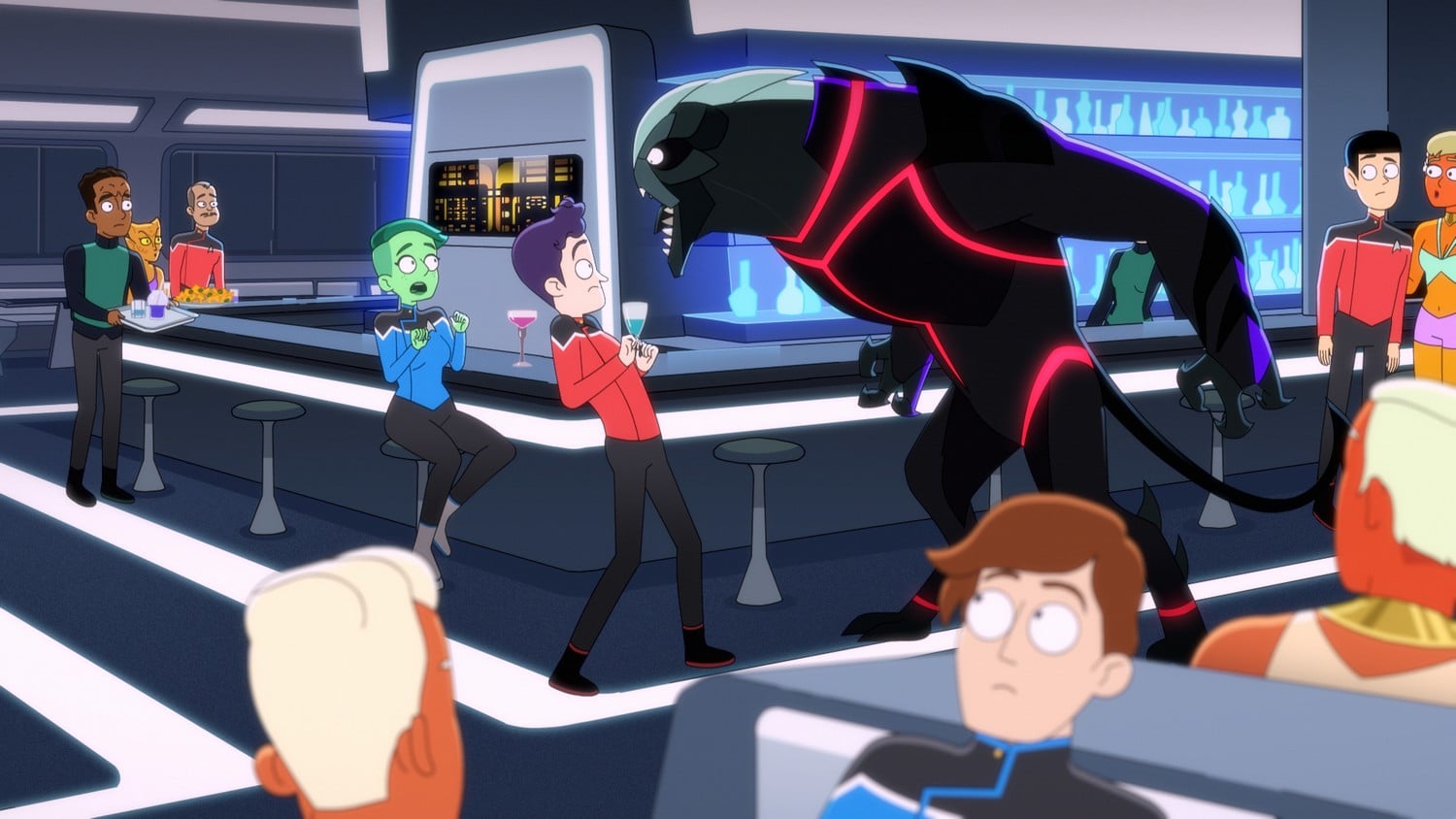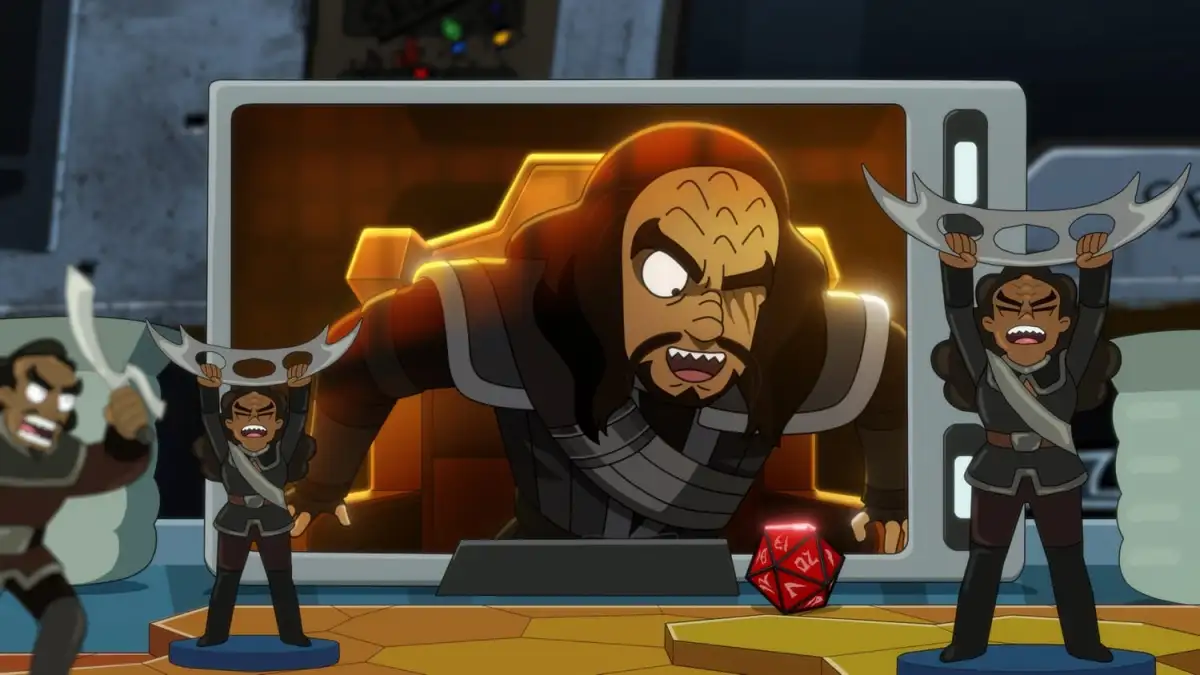This discussion and review contains spoilers for Star Trek: Lower Decks season 3, episode 2, “The Least Dangerous Game.”
“The Least Dangerous Game” captures the easy charm of Lower Decks as a love letter to Star Trek fandom.
There’s an argument to be made that Lower Decks is a show more fascinated by the act of Star Trek fandom than it is interested in Star Trek itself. This isn’t necessarily a criticism. After all, so many of the major modern franchises are (whether implicitly or explicitly) about the performance of fandom. The four main characters of Lower Decks are perhaps better understood as hardcore Star Trek fans than they are as Starfleet officers, characters navigating their lives by the logic of Star Trek.
This is obvious from the teaser of “The Least Dangerous Game,” which begins with a reasonably deep-cut piece of continuity that is also quintessential Star Trek for a certain generation of fan. The four leads are playing a board game with an interactive video interface featuring Klingon High Chancellor Martok (J. G. Hertzler). This is an obvious allusion to A Klingon Challenge, the Next Generation VHS board game that featured Robert O’Reilly as a Klingon hijacker.
That board game was arguably as much a part of experiencing the franchise as going to conventions or reading the spinoff novels. It’s wonderful to see Lower Decks fold that unusual piece of Star Trek memorabilia into its continuity, demonstrating the obvious affection that the creative team has for the franchise and its history. Whatever criticisms one might have of Lower Decks, it is undoubtedly a show made by fans.
Indeed, it is a minor shame that “The Least Dangerous Game” doesn’t lean harder into that concept. After all, the title is “The Least Dangerous Game,” which is an obvious piece of wordplay on a number of levels. More than that, the teaser ends with the camera pushing in on Martok welcoming the lead characters into the game. “And so begins the greatest adventure of your lives,” he bellows. “You will all die on this quest, but will you do it… with honor?” The leads cheer. The credits play.

More than any other Star Trek spinoff, with the possible exception of Voyager, Lower Decks is a show that thrives when it goes off-format. The best episodes of the first two seasons, like “Crisis Point,” “I, Excretus,” and “wej Duj,” were those that leaned into high concepts. Given that Lower Decks can occasionally feel like Star Trek fans engaging in some goofy roleplaying adventures, it might have been fun to heighten that by having its characters do their own roleplaying adventure.
Like “Grounded” before it, “The Least Dangerous Game” quickly takes a bold new high concept and turns it into an otherwise conventional Lower Decks episode. As is standard for the show, “The Least Dangerous Game” is a speedrun through a loose assemblage of familiar Star Trek plot devices with winking self-awareness thrown in. After 10 episodes of Strange New Worlds, it is at least refreshing to watch a Star Trek spinoff that is aware of how derivative it is.
“The Least Dangerous Game” is built on a host of familiar Star Trek tropes thrown into a blender. The Dullean “space elevators” (sorry, “orbital lifts”) are an allusion to “Rise.” The planet’s “wellness-based” culture where they “run everywhere and kiss hello” is modeled on Gene Roddenberry’s fixation on sexy alien planets, evident in episodes like “Haven,” “Angel One,” “Justice,” or “Captain’s Holiday.” Mariner’s (Tawny Newsome) skydive is lifted directly from JJ Abrams’ Star Trek.
K’Ranch’s (Nolan North) “undeniable natural urge to hunt” is obviously built on the science fiction trope of aliens that are big game hunters, but Star Trek has more than its fair share of stories built on the concept. After all, series creator Mike McMahan has acknowledged that K’Ranch is modeled on Tosk (Scott MacDonald) from “Captive Pursuit,” and his entire schtick is lifted directly from the Hirogen on Voyager. As ever, the production team demonstrates a palpable joy in playing with these toys.

This is perhaps the biggest difference between Strange New Worlds and Lower Decks. Strange New Worlds suffers from recycling all these familiar elements with an unearned sincerity, treating retreads of familiar stories as an end unto themselves. In contrast, a large part of the fun of Lower Decks is in watching a Star Trek show where all of this strangeness is just part of the job. It is just stuff that happens, because the audience has already seen it happen countless times.
“The Least Dangerous Game” can play the subplot in which Billups (Paul Scheer) and Rutherford (Eugene Cordero) provoke the Dulleans entirely off-screen because the audience knows how stories like “Justice” play out, so there’s no need to waste time. Similarly, Boimler’s (Jack Quaid) attempt to turn K’Ranch’s hunt back on him isn’t treated as a big twist, but just part of the grammar of these stories. “The hunted always tries to become the hunter,” K’Ranch observes. “Tale as old as time.”
Part of the charm of Lower Decks lies in watching the show operate from a starting point of the insanity of the Star Trek universe and then attempting to heighten it. The revelation that Dullean is ruled by a triumvirate of a creepy baby, an evil computer, and a sentient volcano is delightful, even as Mariner complains that it’s “overkill.” The volcano’s insistence that this separation of powers “provides a system of checks and balances” is perhaps the best laugh of the episode.
One of the most persistent issues with Lower Decks is that the show lacks any real bite in its humor. Outside of something like “Crisis Points,” its jokes rarely say anything meaningful about the larger Star Trek franchise. It’s a shame, given that Deep Space Nine was often willing to interrogate Star Trek, and humor should be able to do that. There is a strangely conservative element to Lower Decks, evident in the way in which the show treats Starfleet and its chain of command.

In “Grounded”, Mariner had to learn to “trust in the system.” This is a highly dubious moral at the current moment, given the state of American institutions, especially the court system. “The Least Dangerous Game” doubles down on this, as Mariner is assigned to work under Commander Ransom (Jerry O’Connell) and finds herself chafing against his authority. As in “Grounded,” Mariner’s impulsive actions do little to actually solve the problem, and she should trust her superiors.
It’s worth briefly considering the plot of “The Least Dangerous Game.” Ransom decides that the command officers should repair the orbital elevators, while the engineers embark on a diplomatic mission. This is self-evidently a bad choice, even before Ransom finds himself reviewing instructional videos and Billups is almost sacrificed to a sentient volcano. However, the expectation is that Mariner should blindly follow his orders, no matter how bad things get.
To be fair, Ransom does eventually come to his senses and apologizes. “I was going out of my way to try to prove that you would disobey my orders if you felt you knew better,” he confesses to Mariner. Later, he is more explicit, “I was wrong to push it.” However, “The Least Dangerous Game” seems to side with Ransom. After all, his apology to Mariner is somewhat undermined by the fact that she has taken it upon herself to disobey his orders, thus proving the point that he was trying to make.
Star Trek is full of unreasonable superior officers who make poor choices that endanger others, whether out of pride or for other reasons. With notable exceptions like “Chain of Command,” our heroes are generally validated in their refusal to follow unethical orders. Mariner is entirely correct when she tells Rutherford that Ransom “was the whole reason you were dangling over the lava to start with.” Rutherford shrugs it off, and so does the episode itself.

There are sharper edges to Boimler’s subplot, in which he essentially commits to the core concept of Yes Man, in the hopes of accelerating his career. Boimler’s willingness to acquiesce to anything leads to him being hunted by K’Ranch, receiving “nerve damage” to his shoulder as a result. It plays as something of a spoof of those “asshole ambassador” plots on The Next Generation, like “Man of the People” or “Liaisons,” where the crew puts up with far too much from a visiting alien.
To be fair, Picard (Patrick Stewart) never went quite so far as to insist that his crew members could not revoke consent to be hunted for sport, but there is something bleakly funny in Captain Freeman (Dawnn Lewis) sternly assuring Boimler, “We have to respect his culture.” It’s the kind of plot that would have felt at home on McMahan’s breakout “TNG Season 8” Twitter feed, which imagined the sorts of plots The Next Generation might have hit had it continued another year.
Boimler’s subplot even ends with a joke about the neatness of the way that these sorts of stories resolve themselves and the trite morals they contain. “Plans are officially out the airlock,” he boasts. “I’m Bold Boimler from here on out.” Tendi (Noël Wells) chuckles nervously. “I’m not sure that was the lesson to learn today,” she offers. “How about… moderation?” That would certainly seem to be a more nuanced read of the episode. Naturally, Boimler rejects it immediately.
As such, “The Least Dangerous Game” ends with the characters back where they began. They aren’t necessarily much wiser for their experience, but at least they had fun along the way.






Published: Sep 1, 2022 11:00 am